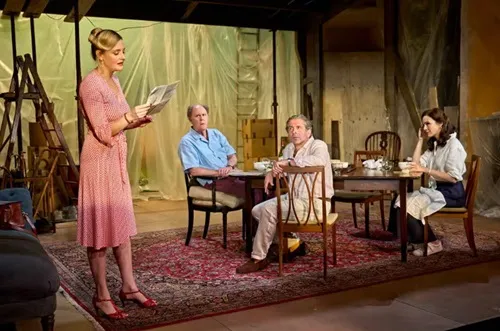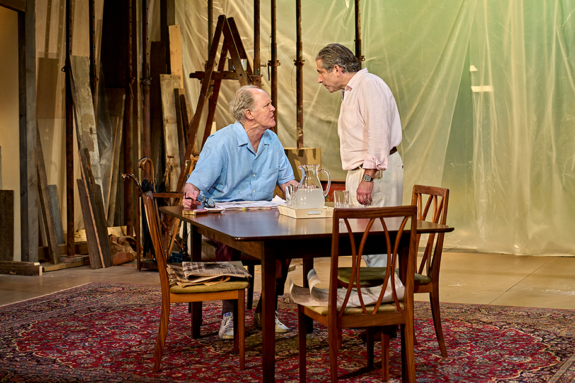 United Kingdom Mark Rosenblatt’s Giant: Royal Court Theatre, London, 4.10.2024. (CSa)
United Kingdom Mark Rosenblatt’s Giant: Royal Court Theatre, London, 4.10.2024. (CSa)

Cast:
Roald Dahl – John Lithgow
Tom Maschler – Elliot Levey
Felicity ‘Liccy’ Crosland – Rachael Sterling
Hallie – Tessa Bonham Jones
Jessie Stone – Romola Gerai
Wally Saunders – Richard Hope
Production:
Director – Nicholas Hytner
Designer – Bob Crowley
Lighting designer – Anna Watson
Roald Dahl was a children’s author of unquestionable genius. Some of his most beloved books, including Matilda, James and the Giant Peach and The BFG (the kind-hearted, gentle giant who spends his time catching dreams and delivering them to children) remain wildly popular long past the writer’s death in 1990. Yet Dahl’s multi-layered personal legacy, marred by his virulent self-confessed antisemitism, is the subject of a brilliant first play by Mark Rosenblatt, masterfully directed by Nicholas Hytner at London’s Royal Court Theatre.
Dahl’s frequently expressed and well-chronicled hatred of Jews was highlighted in a book review he wrote for The Literary Review. The book in question, called God Cried by Tony Clifton, depicted the 1982 Israeli invasion of Lebanon. The article, which called for the destruction of the State of Israel, comparing it to Nazi Germany and casting collective blame for the war to all Jews, caused uproar.
It was compounded by an interview in the New Statesman in 1983 in which he said ‘There’s a trait in the Jewish character that does provoke animosity’, adding ‘even a stinker like Hitler didn’t just pick on them for no reason’. The resulting furore threatened to hamper sales of The Witches, Dahl’s latest book, on both sides of the Atlantic. In the opinion of his UK and US publishers, some form of apology was required.
So much for the recorded facts. The fictional point of entry in Rosenblatt’s deftly written and acutely observed drama takes place in the summer of 1983, one year after Dahl’s critique, in the unfinished drawing room of Gypsy House, Dahl’s family home in Great Missenden. Tom Maschler, the writer’s ingratiating London-based editor (subtly played by Elliot Levey) arrives for lunch later joined by his unpunctual young New York counterpart, the imagined Jessie Stone (a formidable Romola Garai). Both are intent on persuading their sadistic and bigoted client (superbly played by John Lithgow) to publish an expression of regret. We find the great man (at almost 6’4’’, the physical as well as the literary giant of the play’s title) poring gleefully over proofs of Quentin Blake’s cruel illustrations. The emollient Tom, supported by the straight-talking Jessie, suggest a solution to the growing crisis. With a public statement, however small, ‘We can make it go away’.

The ensuing encounter triggered by their simple proposal is skilfully played out over two gripping acts. While the cantankerous Dahl’s exchanges with his two visitors are incendiary and outrageous, they are also frequently humorous. The strength of Rosenblatt’s complex characterisations is that they are above all humane and non-judgmental, leaving it to members of the audience to come to their own conclusions. Dismissing the Kindertransport child émigré Maschler as ‘a house-Jew’ who ‘got out of Hitler’s Germany entirely unflustered’, and as somehow complicit in Israel’s conduct in the Lebanon war, Tom points out that he was at school when Israel was founded and lamely asserts ‘I am English! I am English!’
Dahl is equally disparaging of Stone or ‘Stein’ as he sneeringly refers to her. ‘Are you Jewish…and do you practice?’ Dahl menacingly probes the startled Jessie. ‘And how do you feel about Israel? Presume you’re a fan’. And responding to a warning that an adverse article in The New York Times could result in the removal of his books from the shelves of East Coast libraries and bookshops, he responds ‘Jewtown in Upstate Noo Yoik will have to make do – no survive on a strictly kosher diet of Helen Oxenbury and Sue Townsend’.
No clear explanation for the underlying causes of Dahl’s pathological prejudice is given, but the reasons go far deeper than his wartime experiences in the Middle East or the effect of a traumatic road traffic accident in 1960 which left his son Theo with serious brain injuries, or two years later, the measles-related death of his seven-year-old daughter Olivia. Nor does the weak excuse offered up by his accommodating fiancée Liccy Crosland (Rachael Stirling) provide a rationale – that after years supporting the destitute around the world, the events in Lebanon ‘broke his heart’.
These imaginary exchanges provide more than a glimpse into the relationship between a sadistic and bigoted writer and his Jewish literary representatives. Rosenblatt, who began writing his play in 2018, also touches fortuitously on two issues which have become ever more relevant: the red line between legitimate anti-Israel rhetoric and the forbidden zone of intolerable hate speech since the events of October 7th, and how in our era of casual cancel culture, we fail to distinguish between artists whose personal views we find abhorrent and their art.
These wider subjects are not addressed head-on but subtly permeate the play’s tautly written text. It is left to Jessie to provide the key to the contradictions of Dahl’s stunted personality and towering genius. In a piercing observation she depicts him not as a gentle giant catching dreams and delivering them to children, but as a ‘broken boy in giant’s clothing… a belligerent, nasty child!’ whose threats and cruelties are the gift of his work, but the curse of his life.
Chris Sallon

Perfect description of this very engaging and often shocking play.
Thank you.